DigI-VET - English sMOOC: Unterschied zwischen den Versionen
test 2 |
Keine Bearbeitungszusammenfassung |
||
| (11 dazwischenliegende Versionen von 2 Benutzern werden nicht angezeigt) | |||
| Zeile 433: | Zeile 433: | ||
More information will follow shortly. Many Thanks. | More information will follow shortly. Many Thanks. | ||
Here the link to the DigI-VET learning platform: | Here is the link to the DigI-VET learning platform: | ||
'''Link: http://digivet-tasks.eduproject.eu''' | '''Link: http://digivet-tasks.eduproject.eu''' | ||
| Zeile 440: | Zeile 440: | ||
Find here some examples for the interactive H5P tasks which are included in the learning platform: | Find here some examples for the interactive H5P tasks which are included in the learning platform: | ||
<iframe> | <iframe> https://h5p.org/h5p/embed/692383 </iframe> | ||
<iframe | <iframe> https://h5p.org/h5p/embed/655551 </iframe> | ||
<iframe> https://h5p.org/h5p/embed/918934 </iframe> | |||
| Zeile 499: | Zeile 498: | ||
Techopedia (2020): Digitization. Im Internet unter: https://www.techopedia. com/definition/6846/digitization. Zugriff: 21.04.2020. | Techopedia (2020): Digitization. Im Internet unter: https://www.techopedia. com/definition/6846/digitization. Zugriff: 21.04.2020. | ||
________________________________________________________________________________________________________________________________________________________________________________________________________________________________________________________________________ | |||
The European Commission support for the production of this publication does not constitute an endorsement of the contents which reflects the views only of the authors, and the Commission cannot be held responsible for any use which may be made of the information contained therein. | |||
[[Datei:CC BY SA.jpg|miniatur]] | |||
Aktuelle Version vom 29. August 2021, 18:05 Uhr
Welcome to the DigI-VET MOOC! (in English language)
DigI-VET - Fostering Digitisation and Industry 4.0 in vocational education and training
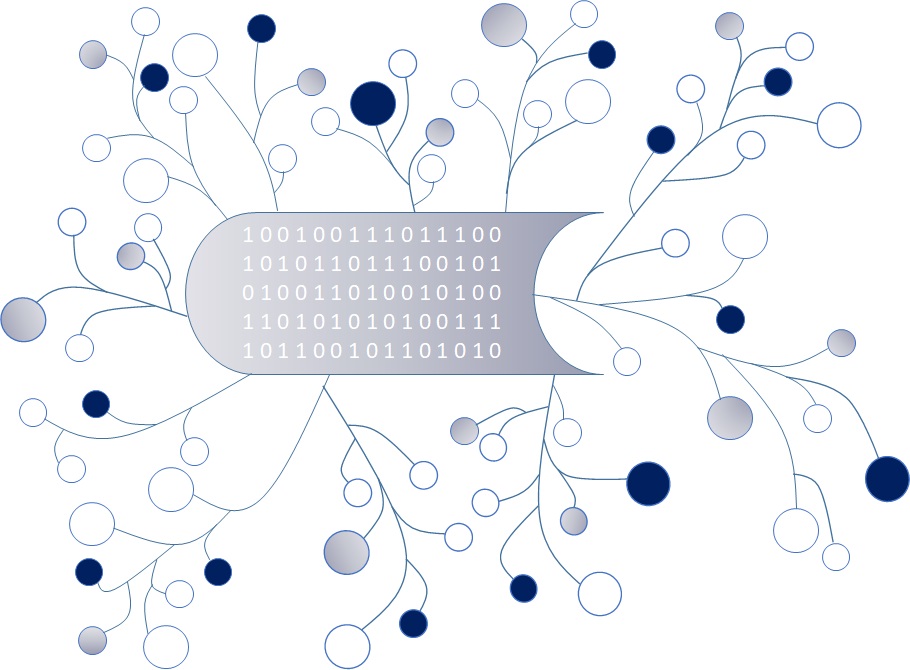
In this sMOOC we inform you about the digitisation/digitalization project DigI-VET and its results as well as about digialization in vocational training. Our project includes a curriculum approach, learning modules and learning resources / teaching materials, best practice showcases and the DigI-VET book. This sMOOC on the project and digitization is also part of the DigI-VET project. You can use this sMOOC use without any charge or cost - just for free. It is an open educational resource (OER).
This MOOC was developed and implemented as part of the DigI-VET project. DigI-VET is an acronym for is and acronym for "Fostering Digitization and Industry 4.0 in Vocational Education and Training." DigI-VET is an international project within the framework of the EU education and support program ERASMUS +.
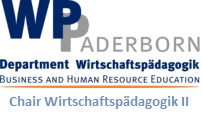

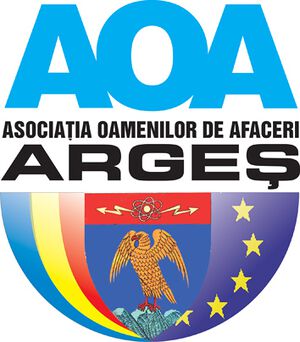
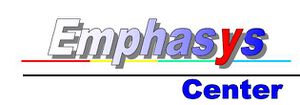
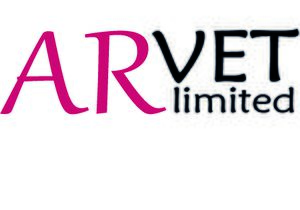


Information on the DigI-VET sMOOC
In this area you will find information about the main target groups, the goals of the MOOC, the results and the idea and structure of the DigI-VET sMOOC.
Main target groups
The main target groups of the sMOOC are:
- Teachers in VET
- Vocational trainers and HR developers in companies
- Vocational trainer in education administration
- Vocational training organizations and institutions
- DigI-VET users
Aims of the DigI-VET sMOOCs
The aims and objectives of this sMOOC are ...
- To give vocational trainers an insight into the challenges of digitization.
- to provide an overview of the competence profile digitization.
- to present the modules of the curricular approach of DigI-VET.
- to offer examples of digitization.
- to provide educational and didactic hints.
- to initiate discussions on the ideas and topics of the project.
- to raise awareness of the challenges of digitalisation in VET.
- to introduce the project DigI-VET.
Outcome
The users / learners in this sMOOC
- Gain knowledge about the challenges and opportunities of digitization in VET contexts.
- solve tasks to gain in-depth knowledge and knowledge in the field of digitization.
- focus on European educational approaches to digitization.
- rethink the form of digitalization training and Industry 4.0.
- Gather knowledge about ERASMUS + ProjeCt DigI-VET.
Structure of the DigI-VET-sMOOC
This sMOOC makes it easier to find information on digitization and industry 4.0 and thus to obtain a basis for using it adequately. It helps to create innovative vocational training and to adopt a European approach. You, the vocational educators, teachers and trainers, should get an idea of the opportunities and challenges associated with digitization and Industry 4.0 and how useful these aspects are. That's why we decided to provide information and learning activities about: > the idea of DigI-VET > insight into the difference between digitization and digitalization > insights into possible competence profiles > the presentation of the importance of pre- and post-processing sequences > the link to our DigI-VET project website.
So let us start!
Introduction
When we talk about digitization, we focus on a current topic which is subject to a broad discussion. In its origins, the German interpretation of digitalization rather reflects what is being discussed as digitization in the English language, because with digitization we often refer to a transformation of analog information, data and values into a digital form or a digital format. From time to time we also take the administration, processing and storing of such digital formats into consideration and discuss the necessary IT systems or the necessary technical equipment in schools or vocational contexts. But that is not everything today. Digitization has many other connotations and effects, as it leads to process-related changes, which today are often thematized under the heading of Industry 4.0. Here, VET is not only about the need for technical reporting, but more important and, in the long term, more important for opportunities and challenges in the media, didactics and education fields.
The DigI-VET Project
The Erasmus + Project DigI-VET - “Fostering Digitization and Industry 4.0 in Vocational Education and Training” focuses on new and innovative ways of learning and teaching in the age of digitization and Industry 4.0. The partner consortium creates awareness of the need to take digitalization and Industry 4.0 into account in the context of vocational education and training (VET) and to actively promote them. Therefore the DigI-VET project consortium foster and focus the following fifteen main results:
(1) the DigI-VET Curriculum
(2) the DigI-VET Learning and Teaching Resources
(3) the DigI-VET Online Observatory with best practice information and videos
(4) the DigI-VET Book on Digitisation and Industry 4.0 in European VET
(5) the DigI-VET sMOOC
(6) the DigI-VET research report
(7) the DigI-VET dissemination materials (posters, leaflets, brochure, cards, pens, flyer)
(8) the DigI-VET Website with Blog
(9) the DigI-VET Checklist for VET educators and teachers
(10) the DigI-VET videos (integrated in the website and the online observatory)
(11) the DigI-VET OER strategy
(12) the DigI-VET digitisation concept for VET
(13) the DigI-VET publications, newsletter and press articles
(14) the DigI-VET sMOOC Concept
(15) the DigI-VET evaluation report
The DigI-VET book offers to a broad readership insights and study results of digitization in the professional educational context. The project results as well as the learning and teaching materials and trainings are part of the work and offer instructions and assistance for handling and implementing them in learning and teaching. Readers get to know the developments and challenges in the current and future working world and to anticipate the form in which digitization will influence them and what significance this will have for vocational training and teachers and providers in the field of vocational training. In addition, the DigI-VET book offers checklists and information about dealing with digitization as well as the learning and teaching materials developed for teachers and trainers in vocational training.
The aim is to develop and evaluate a digital competence profile for vocational training (Digital Competence Profiles for VET). In order to convey direct impressions of digitization and Industry 4.0, the project offers an Online platform/ Online Observatory in which best practice and Showcases are presented, which provide insights into companies and firms that are currently being used and how they deal with digitization and their future expectations. This platform also offers teaching and learning materials as well as examples with texts, audios, videos and photos. In this way, case studies from Industry 4.0 can be more easily embedded in the “classroom” learning environment.
Current Industry 4.0 approaches primarily focus on a symbiosis between production and new IT technologies in order to improve industrial processes and collect adequate data. In this sense, digitization is a key to dealing with these approaches. However, this does not only mean changes in industry and production, but also opportunities and challenges in the field of vocational education and training. Digitization and Industry 4.0 are often understood as the fourth industrial revolution. Such an approach focuses on product digitization in the sense of end-to-end digitization. This also includes the expansion and redesign of existing products, but also requirements with regard to the new skills required. For teachers in vocational training, it is a major challenge to find and compile the information on a rapidly changing environment, in terms of the working and living environment, and to identify appropriate ways to convey this new knowledge and information to the learners. Therefore, the DigI-VET project also focuses on the design of an acceptance study in the partner countries in order to obtain a European perspective on acceptance, experiences, problems and opportunities in the areas of digitization and Industry 4.0.
The target group are 'teachers, learners and vocational trainers.
The survey examines how these target groups of vocational training see digitization and Industry 4.0 and how they incorporate this into their lessons. The survey also looks at the challenges of Industry 4.0 in vocational training and in vocational training environments. Information is collected on the extent to which the development of a digital economy influences learning and teaching. As part of additional desktop researches, the partners also gather information about mobile learning in their national contexts and the EU. The DigI-VET project is designed similar to a former partnership project under Leonardo II and includes only two intellectual output focussing the quantitative and qualitative research on the topic and the design of the DigI-VET book. Most of the work concerning matching of approaches and data will be done at the three meetings of the partners. The results of the surveys will be presented in the book and together with the best practices and the DigI-VET sMOOC at the multiplier events.
DigI-VET offers the innovative new world of work and IT to VET educational contexts and the curriculum helps teachers to integrate these new challenges into their daily teaching All important information about the DigI-VET project are available on the project website under the following link:
Insights about challenges and opportunities of digitization and Industry 4.0
Many aspects and processes are changing in social life and economy in times of transformation. Mar Negreiro and Tambiama Madiega from the European Parliamentary Research Service – EPRS describe this with the following words: “A digital revolution is transforming the world as we know it at unprecedented speed. Digital technologies have changed the way businesses operate, how people connect and exchange information, and how they interact with the public and private sectors. European businesses and citizens alike need an adequate policy framework and appropriate skills and infrastructures to capture the enormous value created by the digital economy and make a success of digital transformation.” (Negreiro / Madiega 2019, p.1).
In the digital strategy of the EU, the European Commission states that “we are at a crossroads in the development of the European Union. The medium-term challenges facing Europe include globalisation, climate change, demographics and digitalisation.” (European Commission 2018). Currently, there are huge discussions on the impact of digitisation in companies and the field of IT. Nevertheless, there are not huge changes in society and economy, but also in the educational sector. “Digitisation is no longer only a topic for industry but also for schools and higher education and has a strong connection to daily life.” (c.f. Beutner 2019, p. 7)
The following part discuss the challenges and barriers of digitization and Industry 4.0 from two different perspectives:
Opportunities of Industry 4.0 in Businesses
National and international educational sector
Economic Opportunities
Industry 4.0 possess a number of opportunities as well as challenges in companies and Small and Medium Enterprises (SMEs). This chapter will focus on defining the opportunities of Industry 4.0 in businesses arising in economic, political, social, organisational and environmental fields:
Economic challanges and opportunities
While companies willing to transform the traditional operation procedures into digitalised ones, those who are unwilling to adapt to the changes Industry 4.0 possess are left behind. The changes need to be made towards integration of new technologies such as robotics and artificial intelligence, require massive investments and capital (Teachutzpah 2020). Such investments eliminate the opportunities of SMEs to transform their current systems procedures, eliminating chances of gaining competitive advantage and sustaining their place in the global digitalised arena. A research by Human Sciences Research Council (HSRC) "Meta-Research" (2018) concluded that 63% of business experts stated that their business future depends on the Industry 4.0 transformation. That in turn, places businesses in the need of establishing standards that will allow their transmission to digitalisation via exploiting large quantities of data as Industry 4.0 requires to. Therefore, a risk factor for companies is the lack of capital especially for SMEs mainly because these enterprises are not able to access how it will affect their value chains and modernised systems are expensive (European Parliament, 2015). To this extend, governments need to promote policy measures that could facilitate better integration of SMEs into the digitalised transmission as well as companies to increase cooperation with other businesses in order to build a value network which could produce products in a flexible fashion.
Political challanges and opportunities
A significant challenge Industry 4.0 needs to address is data ownership and security. Within the context of Industry 4.0, large quantities of data are being collected and shared. Enterprises are required to maintain data privacy and avoid share of data with other enterprises. Cybersecurity, intellectual property and data privacy are among the challenges noted as a consequence of managing an immense volume of data. Businesses need to use systems to analyse data properly, with machine learning and AI. Nevertheless, to address this challenge, governmental and European rules on privacy, data storage and copyright which secures data protection is a perquisite which ensures the successful development of Industry 4.0 in businesses (European Parliament 2015). Moreover, advanced use of technology leads into the development of legal issues in regard to monitoring and evaluating employees. This assumption is influenced by the use of an autonomous digitised system which links different value networks to produce a specific product. As previously noted, Industry 4.0 offers the opportunity to individualised product creation however Intellectual property rights (IP) of the design of the product need to be secured. In this respect, the French Council of Economic Analysis has proposed the securing of a balance between the stimulation of innovation by protecting IP and the sharing of knowledge.
Social challanges and opportunities
One of the greatest challenges posed by digitization and Industry 4.0 for the social and cultural area are the questions of Protection of privacy . A study presented in the 21st International Conference on Advanced Communication Technology (ICACT) in 2019 noted that the enablers of Industry 4.0 include AI and Robotics, Augmented Reality (AR), IoT, Cyber-Physical System (CPS), Cloud and Big Data and Blockchain Technology which all impact on data privacy concerns. For instance, the AI and Robotics enables for real-time image processing revealing human identity and leaking personal information. Furthermore, the AR imposes the risk of sharing personal data through the use of cookies or beacons to gather information. Also, CPS can develop privacy revealing information because of interfering with the physical properties of the system and through cyber-attacks. Industry 4.0 possess ethical challenges that need to be addressed specifically through policy measures, regulations and awareness as it stands as a barrier to the many opportunities that it offers and to the its evolution. It can be seen that Industry 4.0 is faced with particularly ethical challenges, which must be specifically addressed through political measures, regulations and awareness-raising measures, as it represents an obstacle to the many possibilities and opportunities.
Organisational Challenges
In relation to privacy concerns, companies could be exposed to malicious attacks that result in serious financial burdens in addition to immeasurable losses such as data corruption, system crashes, privacy breaches, prestige, customer, reliability and market losses (Evrural 2018). Companies need to overcome the challenges regarding cyberattacks which are expected to be inflected due to the expansion of network connections. Cyber-attacks in businesses have already increased over the last decades. The specific situation requires businesses to strengthen their cyber security capabilities and to develop new strategies with technological investments in IT security thus to curb a risk of cyber-attack. Moreover, another challenge business could potentially face as an outcome of Industry 4.0, is the lack of high-skilled IT employees. The demand for big data analysts, along with specialisation of analyst roles is expected to be increased. The number of professionals that will provide protection and support for online activity covering fraud and identity theft to social media and reputation management are also to be needed (Dimitrie Canterim Christian University 2016). Businesses also need to maintain the integrity of production processes. Referring to data protection, data integrity also determines the consistency between customer requirements and the manufacturing of a product based on these needs. In essence, data include relevant product information and either products or individual information cannot be used without managing data properly (Friedhelm LOH Group 2014). Hence, when data security and integrity is threatened, integrity in production processes is worsened.
National and international learning landscape
Digitization is changing the learning and teaching environment - there is no question about that! But what are the particular challenges and barriers that can hinder the integration of new learning and teaching processes and strategies? The (further) development of digital skills for teachers and students alike is undisputed. The willingness to learn on their own, which requires individual time management, self-motivation and the ability to deal with new topics and problems independently, can be a challenge for many learners. Overcoming these challenges can hinder the positive use of eLearning, and the insufficient skills of teachers and their inadequate handling of new, virtual forms of learning can exacerbate these negative effects. In summary, in particular the hurdles and barriers are
> Implementation and integration of new, digital learning and teaching processes,
> expansion of the competence profile of teachers and students,
> adaptation of curricular and didactic framework plans for the learning and teaching environment and ensuring the
> technical requirements (e.g. access to technical devices and unrestricted internet access).
It can be seen that in addition to the technical challenges of access to the Internet and technical end devices, individual challenges and didactic challenges also predominate. For this reason, the DigI-VET project has set itself the task of providing appropriate learning and teaching materials for teachers and learners on the subject of digitization, Industry 4.0 and as an open educational resource for those interested.
The DigI-VET Curriculum and Profiles
DigI-VET Learning Outcome Matrix and the DigI-VET Curriculum – Integration into course structures
The Erasmus+ project DigI-VET developed two DigI_VET Learning Outcome Matrix, short “LOM“ and cuririculum, which is integrated in the DigI- VET course structure. At this point it should be illustrated how the results match the teaching and learning methods and assessments in the DigI-VET approach. The following general goals and objectives focus on the LOM: This Learning Outcome matrix is designed to inform about the development of the curriculum structure to integrate Digitisation and Industry 4.0 in VET-courses. Focusing on a learning outcomes approach facilitates the tailoring of the pedagogic induction resources. This provides the possibility to suit specific cultural and societal values and ensures that local issues and necessary topics are addressed within the DigI-VET approach (DigI- VET 2020). The topics addressed in the Digi-VET-measures for Persons who are
teachers and trainers or/ and learners in the field of VET are:
General part of DigI-VET measures:
1. A Short overview of project objectives and aims to achieve
2. Introduction to the DigI-VET curriculum
3. The target group -
Characteristics of the DigI-VET target group, their needs and expectations
4. Introduction to the e-learning platform.
Subject related part of DigI-VET measures:
5. Definitions- of terms
6. Description of the history towards digitisations and industry 4.0
7.The need of digitisation in today´s world of work
8. Current status and future developments
9. Examples of Industry 4.0 Approaches using the Online Observatory
10. Best practices of integrating digitisation in VET-scenarios and courses (DigI-VET 2021, in print).
Aspects and challenges for the target group of teachers, trainers as well as learners, pupils and students in the field of vocational training
Pedagogical approaches and the idea of being “learning facilitators” are important for teachers and trainers in VET, as well as the different learning styles, the quality of the curriculum and their support. Especially with regard to the use of the e-learning platform and resources. A particular challenge with regard to the DigI-VET curriculum could be the lack of time. Therefore, the greatest challenge will be to tie the time frame and effort accordingly. In addition, the main challenges are the authenticity, the motivation of the learners, the perseverance and patience in the tutoring and mentoring processes and a stable technology. It is important that the measures are implemented precisely, briefly, relevant and in a flexible manner in direct personal exchange. The benefits of participation need to be highlighted and opportunities for questions and networking increased. It is necessary to provide adequate time slots for the needs of the participants. Based on the research results of the DigI-VET partners, the following two LOMs could be derived:
> Learning Outcome Matrix (LOM) for the target group of teachers and trainers in the field of vocational education (DIGI-VET LOM1)
> Learning Outcome Matrix (LOM) for learners in the field of vocational education (DIGI-VET LOM2)
The learning matrices and explanations are available for download on the DigI-VET project website:
http://digivet.eduproject.eu/?page_id=44&lang=de
In addition, the DigI-VET book offers an introduction to Chapter 11 "The DigI-VET learning outcome matrix and curriculum - integration into the DigI-VET course structure" for further information on the implementation of the LOM. The digital version as a download is also available for you as OER on the DigI-VET project website under Download: Link: http://digivet.eduproject.eu/?page_id=44&lang=de
Overview of the digitization competence profile
In times of globalization everything is changing. There are huge changes in the economy, but also in the educational sector. One reason for that is the digitalization and digital transformational processes. Particularly in the field of education, new challenges have arisen as a result of digitisation processes (cf. Beutner 2019; cf. KMK 2016). Keywords such as digitization and industry 4.0 are more present than ever before (cf. Sloane Sloane / Emmler / Gössling / Hagemeier / Hegemann / Janssen 2018). “Digitization is the process of converting analog signals or information of any form into a digital format that can be understood by computer systems or electronic devices. The term is used when converting information, like text, images or voices and sounds, into binary code. Digitized information is easier to store, access and transmit, and digitization is used by a number of consumer electronic devices” (Techopedia 2020).
These enormous changes require new tasks and demands on learners and teachers. This also requires new competences. A competence area refers to learning and teaching with new media and can be classified as digital competences (cf. DigCompEdu 2018).
Digitisation requires new fields of action for teachers and learners. Within these fields of action there are huge influences. The German Kultusministerkonferenz (KMK) defines following areas of changes for schools:
• “Educational plans and teaching development, curricular developments,
• education, training and further education of educators and teachers,
• infrastructure and equipment,
• educational media, content,
• E-government, school administration programmes, education and campus management systems,
• legal and functional framework conditions“ (KMK 2016, p. 4).
Depending on the school type, digitalisation influences these areas in various measures (cf. KMK 2016). In the view of the huge changes, new strategies regarding the curriculum and contents of lessons have to be developed. Therefore, KMK describes two objectives:
1) All federal states in Germany include the required competences which are necessary for an active, self-determined participation into their curricula and education plans as well as framework plans. In addition to professional competencies, digital competencies are also developed. In the context of digitisation, all lessons are concerned. For this reason, all learning areas have to be adapted to digitisation processes. In this respect, the integration of the digital world is essential (cf. ibid.).
2) An adapted design of lessons leads to more freedom for learner´s individualisation. Besides, learners will get the possibility for taking personal responsibility (cf. Sloane et al. 2018). Furthermore, digital learning environments help students to become part of a team and to organise, to develop solutions together, to provide feedback. All in all, the students get more responsibility for designing their own learning process and transferring their knowledge to practical situations (cf. KMK 2016). Based on these, the construct of digital competence develops as an important role within school education. At this point KMK defines six fields of competences for “competences in the digital world” (KMK 2016, p. 10):
1) Searching, Processing and Storage
2) Communication and Collaboration
3) Production and Presentation
4) Protection and Safety
5) Problem solving
6) Analysis and Reflection (cf. KMK 2016, pp. 10).
Digitization and skills in vocational teaching and VET classroom
DigComp 2.1 and DigCompEdu publish a research study and present a digital competence framework for vocational education (cf. DigComp 2.1 2017; cf. DigCompEdu 2018). The following illustration shall give a closer look within this framework:
“The DigCompEdu framework aims to capture […] educator-specific digital competences. The framework is directed towards educators at all levels of education, from early childhood to higher and adult education, including general and vocational training, special needs education, and non-formal learning contexts. It aims to provide a general reference frame for developers of Digital Competence models, i.e. Member States, regional governments, national and regional agencies, educational organisations themselves, and public or private professional training providers” (DigCompEdu 2018, p. 1).
Digital Competence Profile of DigI- VET
The following competence profile, the VET-DigCom Model, is the result of a desktop research about needed competences in the field of digitisation in enterprises and education. The figure below illustrates the research results graphically:
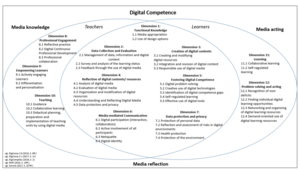
The figure shows the competence profile in the field of digitization. Under the roof of digital competence, the media knowledge, the media acting and the media reflection are located (cf. Schorb 2017). These three types are the fundamental elements of the construct of digital competence. These elements form the framework of digital competences (cf. ibid.). These include in total eleven dimensions, which consists of further sub dimensions. Moreover, you can see that some dimensions are only for teachers or learners. There is also an intersection. In detail, it means that some dimensions of digital competences apply for both target groups (Stelzer 2021, in print).
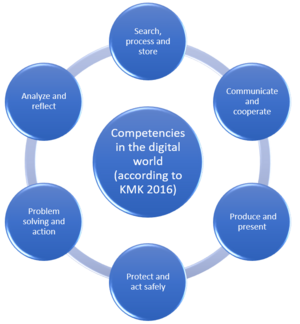
You can read the entire article on "Digital competencies - competency profiles in the vocational context" Jana Stelzer, 2021 (in print) in the book DigI-VET, Fostering Digitization and Industry 4.0: Education - Vocation - Industry - Future (2021, in print) .
You can download the book from the project website under the heading "Download":
Link: http://digivet.eduproject.eu/?page_id=44&lang=de
DigI-VET learning and teaching materials
Training modules for learners as well as teachers and trainers in vocational education One of the main aims of the European project DigI- VET is to create a curriculum structure to integrate Digitisation and Industry 4.0 in VET- courses. Therefore, the curriculum has a module structure and offers insights into current developments. The curriculum goes hand in hand with didactical materials and resource for teachers who wants to integrate it in their course structure. All the results are part of Intellectual Outcome 4 and available as download on the DigI- VET project website:
Training modules for teachers and trainers in VET
Training Modules for VET- teacher and trainer
Module 1: The DigI-VET project and the DigI-VET curriculum
• created by University of Paderborn, Germany
Module 2: Digitisation and Industry 4.0 Terms and history • created by Private Institute Emphasys Centre, Cyprus
Module 3: Good practices of digitization and Industry 4.0 • created by VAR Vocational Education and Training Ltd, United Kingdom
Module 4: The need of digitization in today´s world and insights into future developments • created by Asociatia Oamenilor de Afaceri Agres Romania, Romania
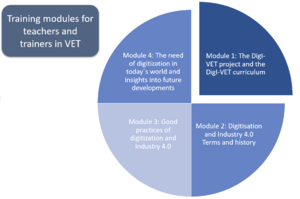
As can be seen from the list, each DigI- VET partner develops one of the modules, which includes learning, discussion and reflection tasks to consolidate the learning content. For a better review and illustration of the content, H5P online tasks and videos are also embedded in the modules. In addition, teaching materials for face-to-face teaching are developed for each module. In addition to definitions, explanations and tasks, these materials also contain assistance for implementation in the classroom.
Training modules for learner
Besides the trainer modules there are 3 modules for learners. Every partner of the consortium creates every module, so at least there are 12 learner modules (4 modules for Module A/ B/ and C). For every learner module a classroom material were created, too. Moreover learning, discussion and reflection tasks complete the training modules; even with the integration of H5P tasks and YouTube videos.
Training Modules for learners
Module A: Digitisation Terms and history
Module B: Industry 4.0 Terms and history
Module C: Current status and future development
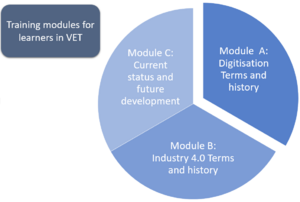
All training modules for teachers and trainers as well as learners are available on the DigI-VET project website under the heading "Download". All modules are available in all partner languages - Greek, Romanian, German and English. You will also receive further information, application notes and assistance for implementation in the DigI-VET book (also available as a download on the website).
Link: http://digivet.eduproject.eu/?page_id=44&lang=de
DigI-VET Learning platform
More information will follow shortly. Many Thanks.
Here is the link to the DigI-VET learning platform:
Link: http://digivet-tasks.eduproject.eu
Find here some examples for the interactive H5P tasks which are included in the learning platform:
DigI-VET Online Observatory
As part of its 15 main project goals, the DigI-VET consortium is developing an online observatory / an online platform in which interested readers can find information and practical examples of the implementation of digitization in companies and Industry 4.0. The platform offers insights into real showcases and offers pictures and videos of best practice examples. In addition, a description of the company and its use of digitization is listed together with the contact details. This leads directly to the online platform of the DigIVET Online Observatory:
Link: http://digivet-platform.eduproject.eu/
== Literaturübersicht:==
Beutner, M. (2019): MeDiAPLUR. Building media literacy in the context of digitisation as a starting point and basis of pluralism in modern democracies Fostering Media competences of Bloggers in Ukraine. New Opportunities and Challenges for Ukraine and Germany. Insights in the MeDiAPLUR Project. Köln 2019.
Beutner, M. / Pechuel, R. (2021, in Druck): Fostering Digitisation and Industry 4.0: Education – Vocation - Industry – Future. New Opportunities and Challenges for European VET. Insights in the DigI-VET Project.
DigComp 2.0 (2016): The Digital Competence Framework for Citizens. European Commission. Im Internet unter: https://publications.jrc.ec.europa.eu/repository/bitstream/JRC101254/ jrc101254_digcomp%202.0%20the%20digital%20competence%20framework%20for%20citizens.%20update%20phase%201.pdf. Zugriff: 15.04.2020. DigComp 2.1 (2017): The Digital Competence Framework for Citizens with eight proficiency levels and examples of use. European Commission. Im Internet unter: https://publications.jrc.ec.europa.eu/repository/bitstream/JRC106281/web-digcomp2.1pdf_ (online).pdf. Zugriff: 15.04.2020.
DigCompEdu (2018): Europäischer Rahmen für die Digitale Kompetenz von Lehrenden. Digitale Kompetenz Lehrender. Europäische Kommission. Im Internet unter: https://ec.europa.eu/jrc/sites/jrcsh/files/digcompedu_leaflet_de-2018-09-21pdf.pdf. Zugriff: 15.04.2020.
DigI- VET (2020): Im Internet unter: http://digivet.eduproject.eu/?page_id=80. Zugriff: 02.12.2020.
Dimitrie Canterim Christian University (2016): Challenges of the fourth Industrial Revolution. Im Internet unter: http://orizonturi.ucdc.ro/arhiva/khe-vol8-nr1-2016/09.%20Petre%20Prisecaru.pdf. Zugriff: 17.08.2020.
European Commission (2018): EUROPEAN COMMISSION DIGITAL STRATEGY. A digitally transformed, user-focused and data-driven Commission. Communication to the Commission. C(2018) 7118 final. Brussels, 21.11.2018. Im Internet unter: https://ec.europa.eu/info/sites/info/files/strategy/decision-making_process/documents/ec_digitalstrategy_en.pdf. Zugriff: 01.07.2020.
European Parliament (2015): Industry 4.0 Digitalisation for productivity and growth. Im Internet unter: https://www.europarl.europa.eu/RegData/etudes/BRIE/2015/568337/EPRS_BRI(2015)568337_EN.pdf. Zugriff: 17.08.2020.
Evrural, B. (2018): Overview of cyber security in the industry 4.0 Era. Im Internet unter: https://www.researchgate.net/publication/319861803_Overview_of_Cyber_Security_in_the_Industry_40_Era/link/5c2e0222458515a4c70a42a6/download. Zugriff: 17.08.2020.
Friedhelm LOH Group (2014): Whitepaper: IT and IT infrastructure in the context of Industry 4.0’. Im Internet unter: https://www.rittaltic.es/KNOW-HOW-FILES/Whitepapers/Whitepaper_IT_and_IT_Infrastructure_in_the_context_of_Industry_4.0_en.pdf. Zugriff:17.08.2020. KMK (2016): Bildung in der digitalen Welt. Strategie der Kultusministerkonferenz. Im Internet unter: https://www.kmk.org/fileadmin/Dateien/pdf/PresseUndAktuelles/2017/Strategie_ neu_2017_datum_1.pdf. Zugriff: 15.04.2020.
Negreiro, M. / Madiega, T. (2019): Digitial Transformation. Briefing. EU policies – Delivering for Citizens. Im Internet unter: https://www.europarl.europa.eu/RegData/etudes/BRIE/2019/633171/EPRS_BRI(2019)633171_EN.pdf. Zugriff: 01.07.2020.
Schorb, B. (2017): Medienkompetenz. In Schorb, B. / Hartung-Griemberg, A. / Dallmann, C. (Hrsg.). Grundbegriffe Medienpädagogik (6th edition), München 2005, S. 254-261.
Sloane, P. F.E./ Emmler, T./ Gössling, B./ Hagemeier, D./ Hegemann, A./ Janssen, E. (2018): Qualifizierung des beruflichen Ausbildungs- und Prüfungspersonals als Gelingensbedingung für die Berufsbildung 4.0. Zentrale Ergebnisse. September 2018. Im Internet unter: https://www.ovm-kassel.info/wp-content/uploads/2018/09/Qualifi.-Ausbildungspers.-4.0-Uni-Paderborn_Sloane_Zentrale-Ergebnisse.pdf. Zugriff: 09.04.2020.
Stelzer, J. (2021, in Druck): Digitale Kompetenzen- Kompetenzprofile im berufsbildenden Kontext. In Beutner, M. / Pechuel, R. (2021, in Druck): Fostering Digitisation and Industry 4.0: Education – Vocation - Industry – Future. New Opportunities and Challenges for European VET. Insights in the DigI-VET Project.
Teachutzpah (2019): Industrial Revolution 4.0- Advantages, Challenges and the Future. Im Internet unter: https://techutzpah.com/industrial-revolution-4-0-advantages-challenges-and-the-future/. Zugriff: 17.08.2020.
Techopedia (2020): Digitization. Im Internet unter: https://www.techopedia. com/definition/6846/digitization. Zugriff: 21.04.2020.
________________________________________________________________________________________________________________________________________________________________________________________________________________________________________________________________________
The European Commission support for the production of this publication does not constitute an endorsement of the contents which reflects the views only of the authors, and the Commission cannot be held responsible for any use which may be made of the information contained therein.
